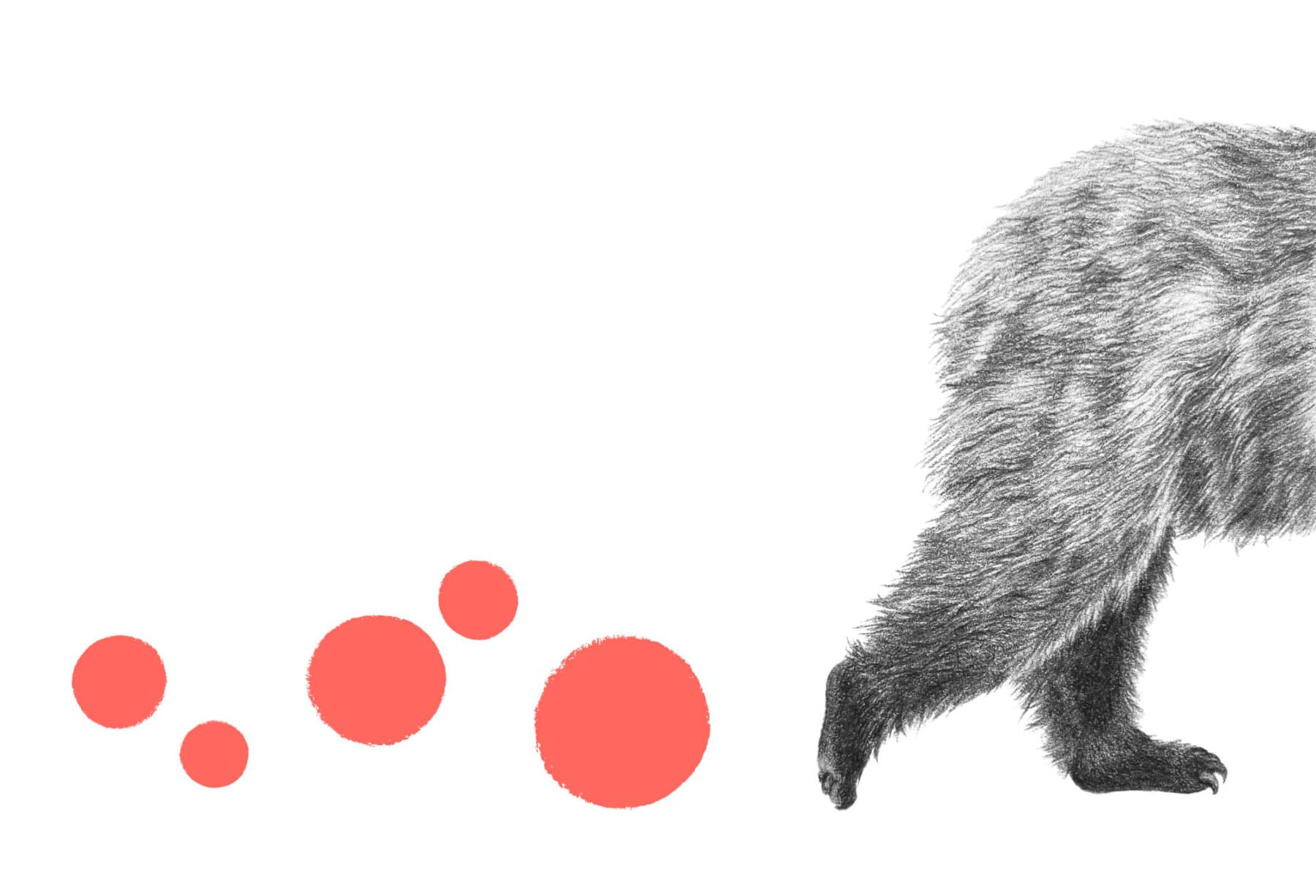When my little brother was in college, he invented a new way for our family to say “I love you” at the end of a phone call. Before hanging up, I’d always say, I love you, bye. And sometimes he would say it back, but sometimes there would be a pause, then, Okaybye. After his first semester, he said, Look, when you call, I’m usually in my dorm and I have roommates. Instead, can we just say, “The roads are icy ahead?”
Which is exactly how our phone calls ended for a few years. Luckily, he moved out of the dorms and grew up. Now, he usually says Loveyoubye, but sometimes he still says, Yeah. Bye, to which I yell, THE ROADS ARE ICY AHEAD, YOU BIG JERK!
My dad is methodical, arguably overinformed, and thus cautious to the point of fearful. When my mom died, it was like my dad took on her worries too. We text a lot: concerns about COVID, Trump, climate change. Recently, he introduced a new concern: bear attacks.
Saturday, June 14, 2020
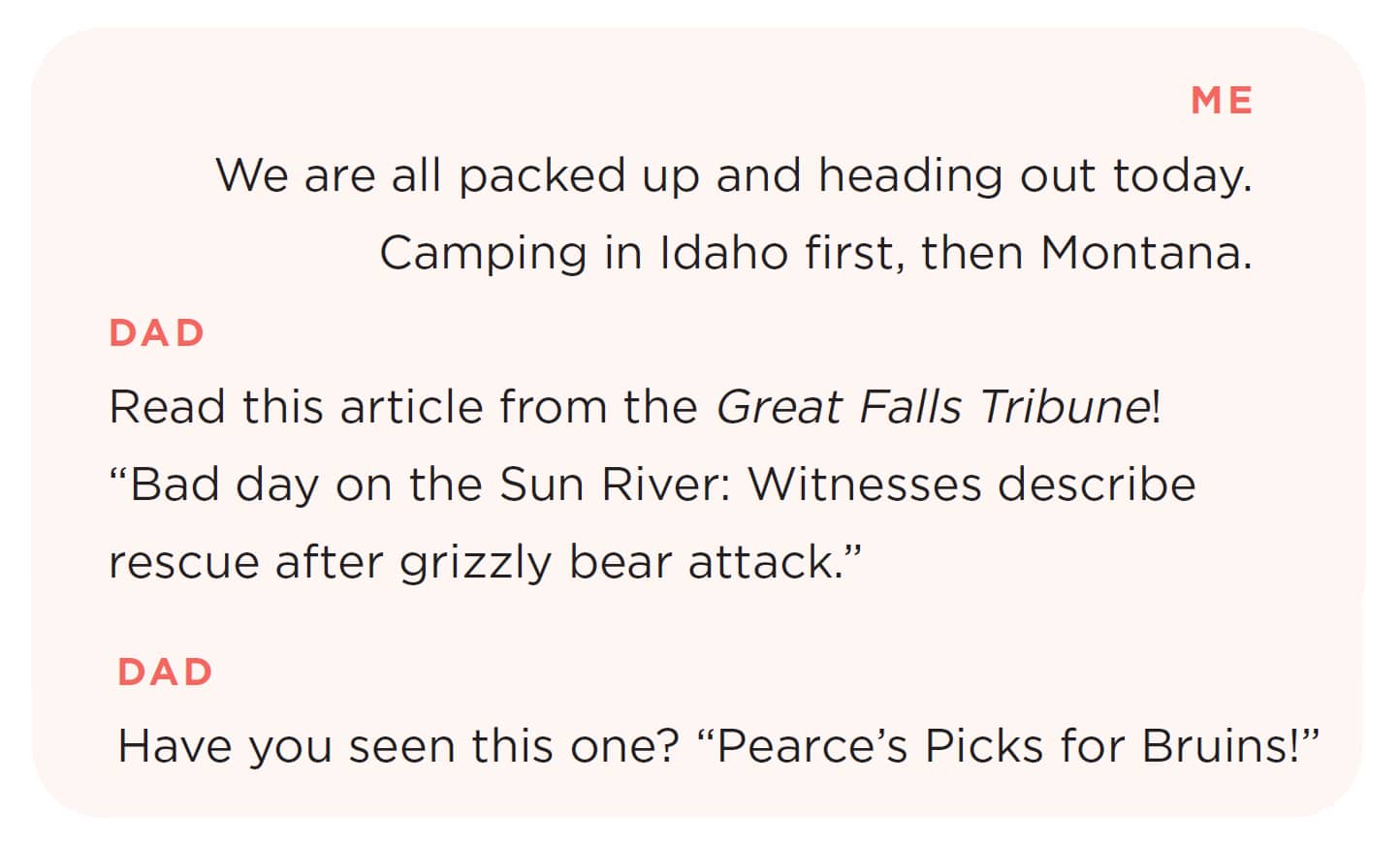
The first sentence of the article: “For the large number of bears that roam North America, there are relatively few attacks on humans.”
The final sentence: “In order to fight to the end, you must have a handgun.”

The article tells a story from the author’s childhood:
That year we had a problem in camp. A large boar black bear would come into camp looking for food. This bear was bold, aggressive and would chase our dog. He even chased my mother into the trailer one morning after my dad and I had left camp for a day of trail rides. . . . I imagined what would have happened to her if the bear had caught her when she was too far from the safety of the trailer. The consequences were unthinkable!
The author grows up, still horse packing into the wilderness, now with his wife. Photos accompany the article: a tableau of two pistols with the book Mark of the Grizzly; a dead bear; three guns captioned as a “brace of Glocks.” In the final section, about training, the author mostly talks about how he has trained his wife to get out of his way so he can shoot the bear.
In North America, the historic range of the grizzly included western North America, from Mexico to Alaska. Western expansion has reduced that territory drastically. The last grizzly in California was killed in the 1920s, and the last grizzly in Arizona in the 1930s. Grizzly bears have been listed as a threatened species in the lower forty-eight, where their population—at one time more than 50,000—currently falls somewhere around 1,900 total. Most of the grizzlies in the states have been made locally extinct; those left live mostly in Montana, then Wyoming, then Idaho, then Washington. My dad isn’t wrong—most of the grizzly bears left in the lower forty-eight do live near the Glacier National Park area of Montana.
How my father imagines a bear attack:
- Be out and about
- Get charged by the bear
- Shoot the bear
a) to slow it down, or
b) to stop it
Dad, let me be perfectly honest: I see no way to shoot the bear.
You will shoot it for me? You just need me to move out of the way?
I don’t want to get attacked by the bear—no one does—but guns won’t help. Dad, there is no way to stop it.
“To stop it” is a euphemism, or a way to say something in a way that is easier than, while still indicative of, the real thing, used so as not to hurt or embarrass the speaker, the listener, or a third party. “To stop it” really means “to kill it.”
My dad is a scientist; he says it like it is, honest to a fault. When I started showing an interest in writing, he read one of my poems for school. It’s missing punctuation, he said. You need a capital there, a comma there, and a period there. I said, Dad, it’s a poem. It doesn’t need all that. He said, Oh, then I don’t know, maybe have your mom look at it.
Now I am a teacher. Now my students say, We can do whatever we want in our stories. This is fiction. There are no rules. Grammar goes out the window. I want to say, Oh, then I don’t know, maybe have your mom look at it.
I am trying to find ways to teach my students about writing fiction honestly. How to invent real characters. To write what they know—imagined but still true. How their readers have to trust the writing, and if they don’t, the story has failed.
How do I teach honest fiction? Do I point out dishonest life? They already think life is dishonest. Fake news. Alternative facts. Political exhaustion. They can imagine honesty but don’t believe it exists. How do I provide an alternative to their skepticism? If I teach my students the words for dishonest language, for duplicity, they might be able to recognize and emulate honesty. In fiction. Then in life. Except I don’t know the names of (dis)honesty either, so I look them up.
Euphemism:
concealment, politeness, understatement
Ex: Mom isn’t going to make it; we lost her; she is in a better place
Orthophemism:
straight talk, directness, precision
Ex: Mom is in the dying process; she is not alive; she is dead
Dysphemism:
insult, crassness, insensitivity
Ex: Mom croaked; she kicked the bucket; she’s pushing up daisies
Consider also the capacity of a word, how many different meanings a word or phrase can have; beyond synonym, this is polysemy. Like the word get:
She got sick.
My dad got her worries.
The bear might get me.
Or maybe like how we imagine bears say –ROAR– an onomatopoeia, when they really mean –hello– or –jeez you surprised me– or –get outta here– but also –I’m attacking you!
Also abstraction, when terms are further removed from the ideas to which they were originally attached. Like how expressing love to your little brother is to avoid embarrassing him in front of his roommates by replacing that spoken word with something further removed, like “roads.” And maybe add the element of danger; turn the love into a subtle warning: “the roads are icy ahead.” Or better yet, an emergency: “THE ROADS ARE ICY AHEAD!” Be willing to do all of this, at least during his college years, for love. But maybe this is just a metaphor, or a sister and a brother speaking in code.
Write this last term down: doublespeak, or distorting language. Sometimes we see this for political gain. Not directly from 1984, but aptly a blend of the two Orwellian terms “doublethink” and “Newspeak.” Like how lies can be termed alternative facts can be termed facts.
My mom was adamant that my dad only own hunting rifles, not handguns. Her logic was that rifles are for shooting deer and handguns are for shooting people. Sometimes my mom used to say, If you shoot a bear, I will divorce you, but sometimes she would say, If you shoot a bear, I will shoot you. When she died, my dad bought a handgun to protect himself from bears. He discovered the first gun he bought was not big enough, and so he got a bigger one. Now he has a brace of Glocks.
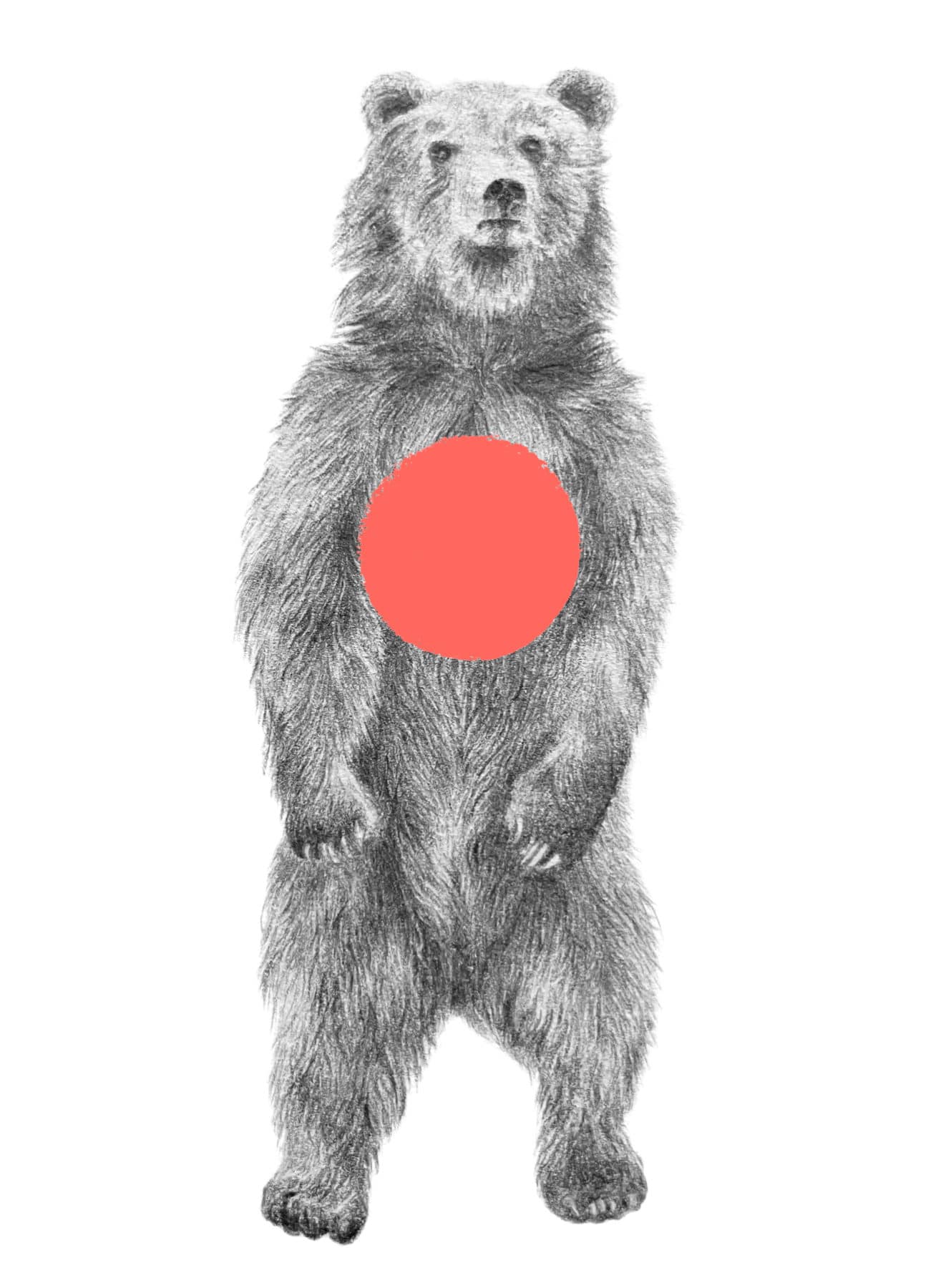
Because of global warming, black bear territory can expand into grizzly bear territory, and grizzlies can move up into polar bear territory. Polar bear territory can’t shift any further north. The top is just shrinking. Polar bears can either swim out toward textbook extinction, or embrace the terrestrial alongside the grizzly.
There is already a grizzly-polar bear: an ursid hybrid. Some people call it the pizzly or the grolar bear. Though I am certain that an interaction with one would be very serious, it is hard to take a pizzly bear seriously; it sounds like a Labradoodle. Fortunately, there’s also nanulak: a combination of the Inuit words nanuk (polar bear) and aklak (grizzly bear).
How was this unusual bear discovered? It was shot. Up close, the hunter saw white fur (polar), brown patches (grizzly), shoulder hump (grizzly), and long claws (grizzly). The hunter may also have noticed its long neck (polar) and foot-pad hair (polar). Eventually, the bear’s blood was genetically tested. More than one nanulak has been shot. More than one has been tested.
Dad, aren’t we all desperate to survive? Including the bear?
Climate on bears:
black bears
↪ shorter hibernation
↪ increased potential for human-bear conflict
grizzly bears
↪ grizzly-polar bear hybrid
polar bears
pushing up daisies
Conservative think tanks on climate:
global warming
↪ climate change
↪ weather extremes
climate change adaptation
↪ resilience to weather extremes
no need to sacrifice now
sacrifice later
Trump on climate:
“The concept of global warming was created by and for the Chinese in order to make U.S. manufacturing non-competitive”
↪ “Is our country still spending money on the GLOBAL WARMING HOAX?”
↪ “Nothing’s a hoax about that. It’s a very serious subject”
“Climate change is very important to me”
until after the next election
Friday, June 26, 2020

Saturday, June 27, 2020
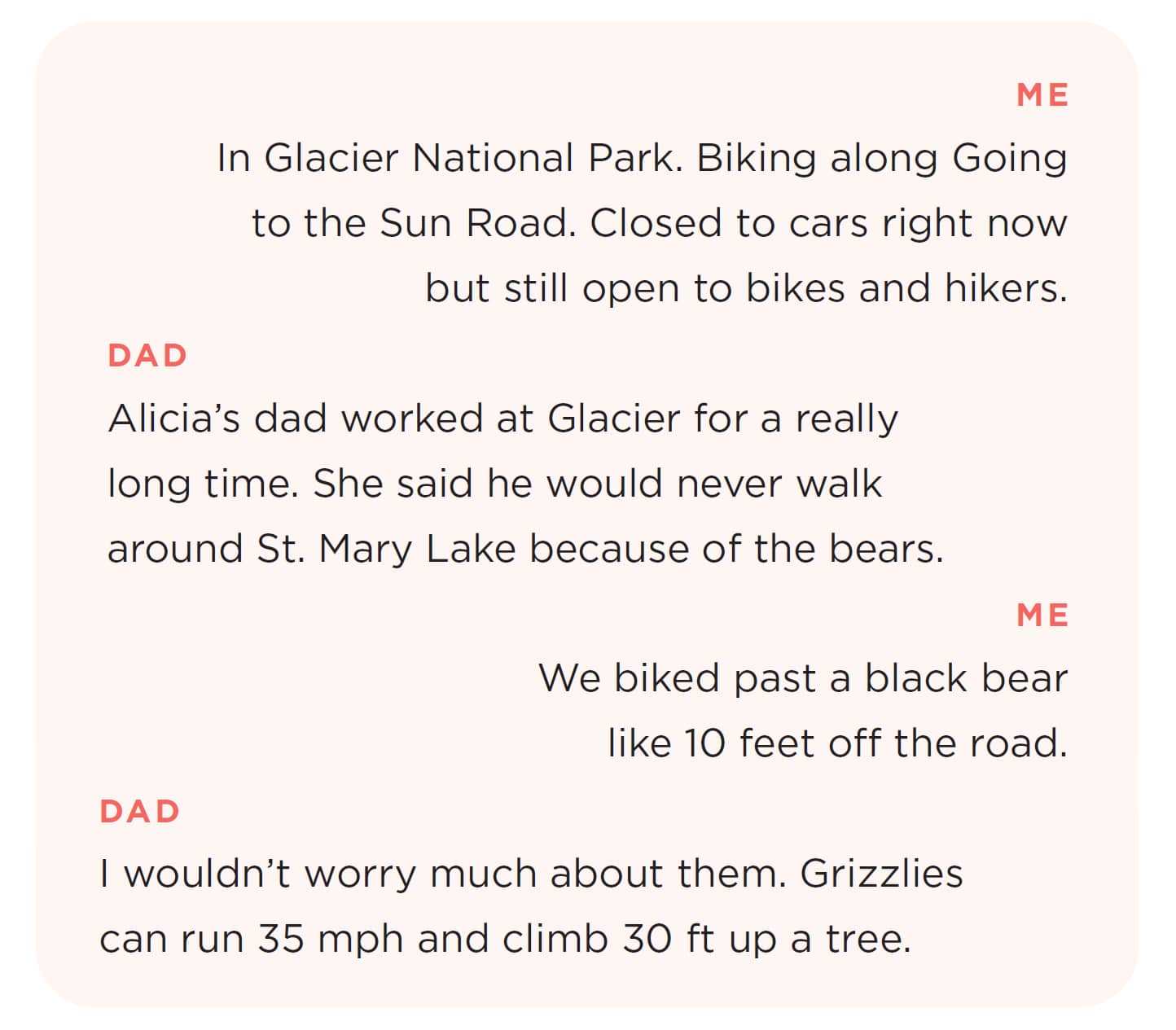
Sunday, June 28, 2020
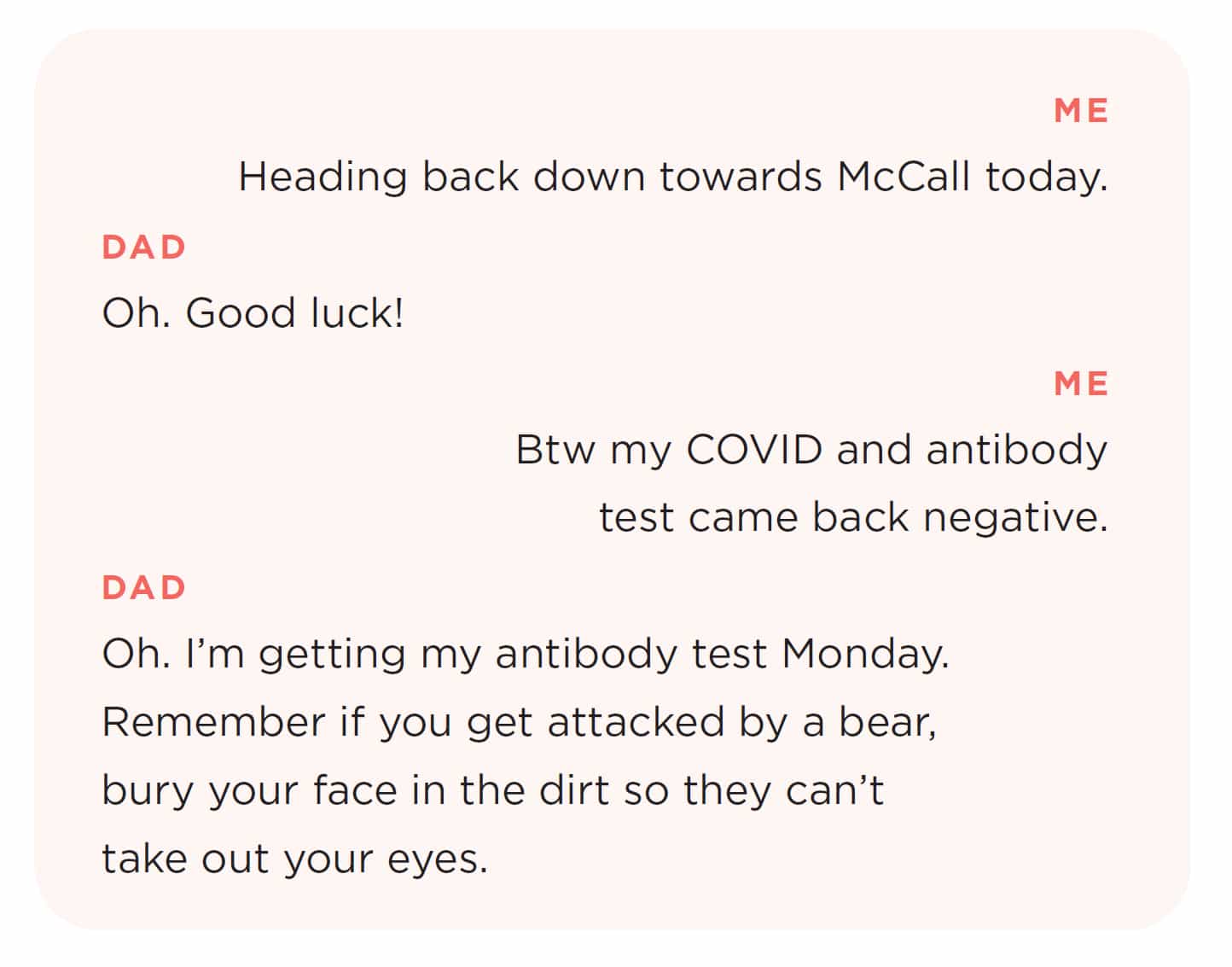
How my brother imagines a bear attack:
The hunter is hiking alone, miles off-trail, bushwhacking through manzanita. There is a massive buck somewhere up the ridge. The hunter saw it the night before from across the canyon. The hunter is not alone. In the mountains, there also live three bears. A cub. Another cub. And a mama bear, who stands up in the manzanita bushes fifty yards away from the hunter. The hunter backs up, which puts him between the mama bear and the cubs. The mama bear charges. The hunter fires a warning shot into the air. The mama bear, thirty yards away, does not even flinch. The cubs each scramble up their own tree trunks. The mama bear is still charging toward the hunter. At fifteen yards, the hunter shoots again. The bear falls into the manzanita.
Dad, I know you want me to take bears more seriously. I know you are trying to teach us about survival. But don’t you see? Even in this version of the story, the hunter does not escape the bear.
Trump on COVID:
“China plague”
↪ “kung flu”
↪ “We will get through this TOGETHER”
“We have it totally under control”
↪ “One day—it’s like a miracle—it will disappear”
↪ “I tested positive for COVID-19”
↪ “This was a blessing in disguise”
“Don’t be afraid of COVID”
be afraid of losing
U.S. recommendations to the public:
Don’t wear a mask
↪ Wear a mask
↪ We are sending you all masks
Isolate for 14 days
↪ Isolate for 10 days
↪ Isolate for 5 days
Healthcare workers, the hospitals need you
mask and stay at work
FADE IN:
BACKYARD LAWN OF DAD’S HOME – EVENING, July 3rd, 2020
WE OPEN in the large backyard of a home adjacent to the forest. A truck is parked on the grass with camping gear spread around it. Two folding tables are spaced 25 feet apart. A couple in their 30’s sits at one table. A couple in their 60’s sits at the other.
DAD
(loudly)
It’s nice we can eat out here and you don’t have to come in.
DAUGHTER
(also loudly)
Yeah, it feels safe to visit like this.
DAD
Do you want to borrow my bear book?
DAUGHTER
I don’t think so.
DAD
The first half is bear information, but the second half is all these accounts of bear attacks. Attack after attack.
DAUGHTER
I don’t want to get nightmares.
DAD
Yeah, if you read it, you might end up like me. Now I know too much.
DAUGHTER
Isn’t there a bear that comes into your yard at night?
DAD
Don’t worry. That bear only comes in the fall when the apples are ripe.
(pause for chewing)
What about a book on reloading?
cut to:
DRIVEWAY OF DAD’s HOME – MORNING, 2 weeks later
The younger couple is in the truck, packed up with all the camping gear, waving goodbye. The older couple is standing near the truck, seeing them off.
DAD
Want some bear spray? I have two cans.
DAUGHTER
If it would make you feel better, Dad, sure.
DAD
(hands daughter can of bear spray)
I keep it in the console, for easy access.
DAUGHTER
(starts the truck)
Alright, then we will too.
DAD
Do you want a holster?
FADE OUT
What is the ursine equivalent of the rabbit hole? The hibernation den? Well, whatever it is, I am scratching dirt from the back of the cave.
In theory, bears can get COVID, and they can spread it. Both grizzly bears and polar bears are considered high risk, meaning they have high zoonotic potential to contract and spread COVID. There is also the possibility that an animal population living near a human population—say, because of deforestation or other loss of habitat—could not only contract COVID from humans, but possibly produce new variants and spread them back to humans. Consider how COVID came to be in the first place.
Deforestation and air pollution contribute to global warming, and global warming contributes to the spread of infectious disease. People living with preexisting conditions like diabetes, like my dad, are more likely to die from infectious diseases. People and animals living with lower air quality are more likely to die from infectious disease. Environment is like another pre-existing condition, another comorbidity. Global warming is a comorbidity.
How I imagine the bear attacked my mom:
When the bear attacked, her body froze slowly. First her left hand stiffened, then her speech slowed. Her whole body slowed. She was unable to run. In fact, she needed help supporting herself. She grabbed hold of a tree and leaned against it. She tried to call for help, to alert others of the danger, but the words didn’t come, just guttural sounds. The same sounds the bear was making before it attacked. The bear was so close, but she was not even able to turn her head. Her neck locked. She was looking straight into the gaping mouth in front of her. Its teeth were wide to bite, which reminded her that she might be able to bite it back. She incrementally opened her mouth to bare her teeth, but it took more energy than she thought. She was able to blink. Her eyes were wide, glaring, ferocious. She refused the feeding tube. At the exact moment when the bear reached out its claws, she stopped breathing.
And her family? We are still here—watching from the manzanita, wanting to help but unable to. Waiting for the bear to rise again.
You hate when I do this, Dad? When I tell a “story” instead of reporting the facts accurately?
Well, Dad, there’s a 50 percent chance the bear is coming for me—for each of your children. That’s a genetic fact.
How the bear actually attacked my mom:
knee injury
↪ arthritis
↪ Lou Gehrig’s
↪ familial ALS ↩
cane
↪ walker
↪ wheelchair
family
made unfamiliar
My mother transformed—so unrecognizable as my mother in the end, we said goodbye to a seemingly false version. Now I try to detail that false version of her, the mother who did not survive, into writing and then into reality. I want to be able to face her death— which could circle into my own death, or my brother’s death, or both—honestly.
How I am preparing for another attack:
- Googling my family’s fears
- Recognizing progressions
- Carrying bear spray
Sunday, July 19, 2020
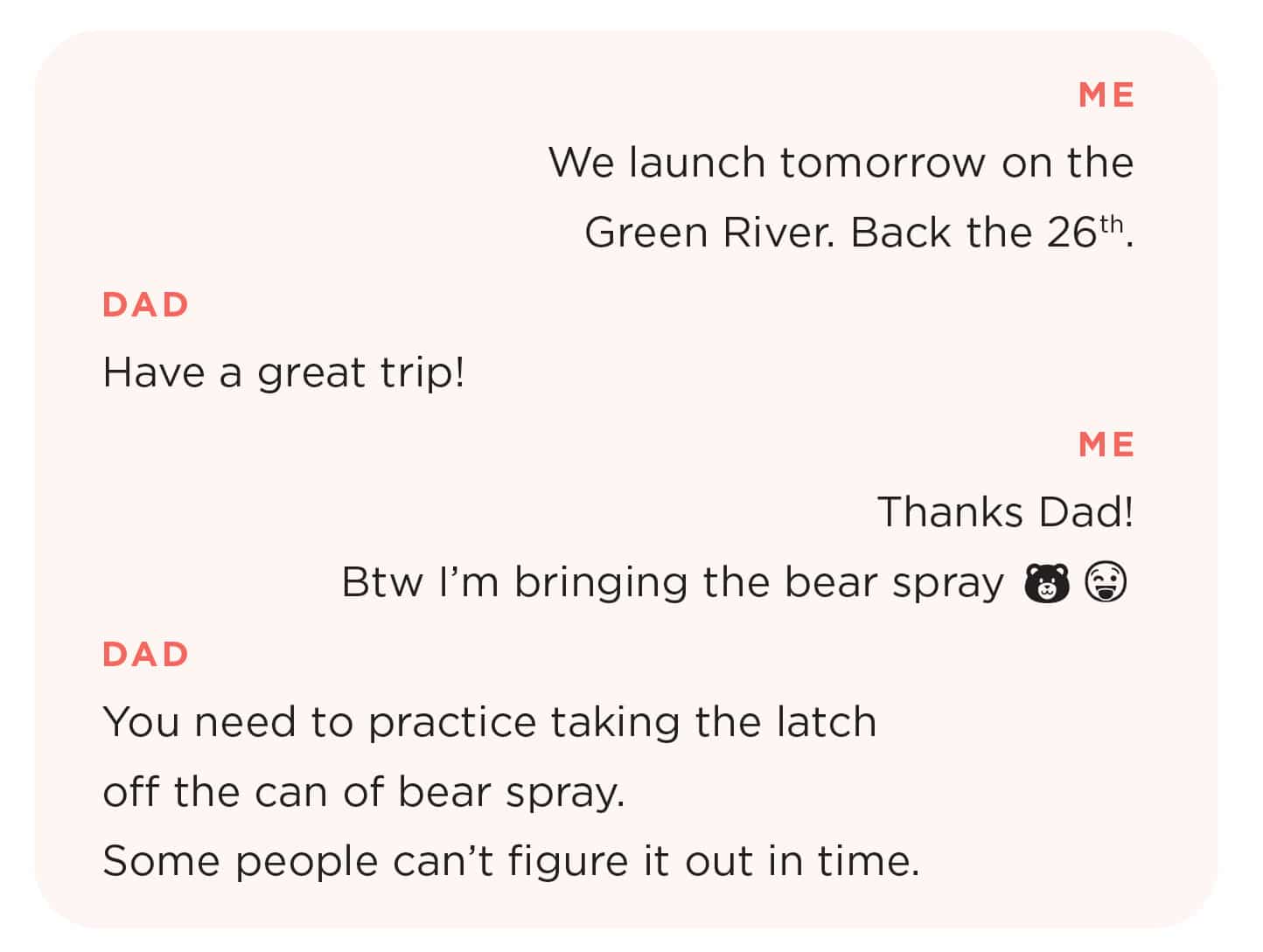
What my dad doesn’t say is—
If you are going to die, please do so in a way that gives me some warning.
What my dad doesn’t say is—
I can’t lose you like we lost your mother.
What I don’t say is—
I know, Dad, the roads are icy ahead.
